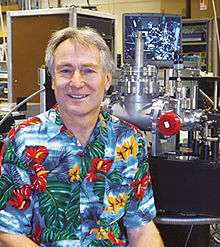Richard J. Saykally
Richard J. Saykally (born 1947) is an American chemist. He is currently the Class of 1932 Endowed Professor of Chemistry at the University of California, Berkeley. He has received numerous awards for his research on the molecular characteristics of water and aqueous solutions.
Richard J. Saykally | |
|---|---|
 | |
| Born | 1947 |
| Nationality | American |
| Alma mater | University of Wisconsin–Madison, University of Wisconsin-Eau Claire |
| Known for | Molecular characteristics and structure of water |
| Awards | Irving Langmuir Award (2000) E. O. Lawrence Award (2004) Peter Debye Award (2009) |
| Scientific career | |
| Fields | Chemistry |
| Institutions | University of California, Berkeley |
Biography
Richard Saykally is the Class of 1932 Endowed Professor at the University of California-Berkeley. Born in Rhinelander, Wisconsin and educated at UW-Eau Claire and UW-Madison, Saykally has been a professor at the University of California, Berkeley since 1979. He and his students have pioneered many important advances in spectroscopy, including velocity modulation spectroscopy of ions, terahertz laser vibration-rotation-tunneling spectroscopy of clusters, infrared photon counting spectroscopy, cavity ringdown spectroscopy, and X-ray spectroscopy of liquid microjets. These have permitted the first detailed study of important textbook molecules, including the hydronium (H3O+), hydroxide (OH−) and ammonium (NH4+) ions, as well as small water clusters and carbon clusters.
Recent work includes the spectroscopic determination of a universal water force field via the study of water clusters, the development of femtosecond nonlinear optical molecular imaging methods applied to single nanowire lasers and biological systems, femtosecond Deep UV SHG/SFG studies of liquid electrolyte interfaces, and soft X-ray spectroscopy of liquids and liquid surfaces.
A co-author of over 400 publications that have been cited over 45,000 times (H index > 100), the recipient of over 75 honors and awards from 15 different countries, Saykally is a member of the National Academy of Sciences and the American Academy of Arts and Sciences, and has recently received the E.O. Lawrence Award in Chemistry from the U.S. Department of Energy, the Hinshelwood Lectureship from Oxford University, the Inaugural International Solvay Chair in Chemistry from the Solvay Institutes of Belgium, the Peter DeBye Award in Physical Chemistry from the ACS, the J.C. Bose Lectureship from IACS-Kolkata, and the Faraday Lectureship Prize from the Royal Society of Chemistry. He is a UC-Berkeley Distinguished Teacher, and has been active at the national level in science education. Over 150 students and postdocs have trained under his direction, many of whom hold prominent positions in academic, government, and industrial institutions.[1]
Awards and honors
- received Camille and Henry Dreyfus Award (1979)
- received Presidential Young Investigator Award (1984)
- named to Miller Research Professor Chair (1985–1986)
- received E. K. Plyler Prize for Molecular Spectroscopy (1989)
- received Michelson Prize for Spectroscopy (1989)
- received Lippincott Medal for Spectroscopy (1992)
- received Berkeley Distinguished Teaching Award (1992)
- received American Chemical Society Harrison Howe Award (1992)
- received Royal Society of Chemistry Bourke Medal (1992)
- received Churchill Fellowship at University of Cambridge (1995)
- received Humboldt Senior Scientist Award (1995)
- named Fellow of American Academy of Arts and Sciences (1995)
- named Fellow of American Physical Society
- named Fellow of Optical Society of America
- named Fellow of Royal Society of Chemistry
- named Member of United States National Academy of Sciences (1999)
- received Pittsburgh Spectroscopy Award (1999)
- received ACS Irving Langmuir Prize in Chemical Physics (2000)
- received the Royal Society of Chemistry's Centenary Medal (2000)
- received the Ernest Orlando Lawrence Award (2004)
- received the Johannes Markus Marci Medal (Czechoslovakia)(2004)
- filled the Morino Lectureship chair (Japan)(2005)
- filled the University of Oxford Hinshelwood Lectureship chair (2006)
- filled the Inaugural Solvay Chair in Chemistry (Belgium)(2008)
- received the ACS Peter Debye Award in Physical Chemistry (2009)
- delivered the Golden Jubilee Thematic Lectures (Indian Institute for Technology, Delhi) (2011)
- delivered the Morris Travers Lectures (Indian Institute of Science, Bangalore) (2011)
- delivered the J. C. Bose Memorial Lectures (Indian Association for the Cultivation of Science, Kolkata) (2011)
- received the Royal Society of Chemistry Faraday Lectureship Prize (2012)
- delivered the W. A. Noyes Distinguished Lecture in Physical Chemistry (University of Texas, Austin) (2013)
- delivered the CaSTL (Chemistry at the Space-Time Limit) Lecture (University of California, Irvine) (2014)
- received the E. Roger Washburn Memorial Lectureship in Physical Chemistry (University of Nebraska) (2016)
- named Keynote Speaker NANOLYTICA (Simon Fraser University) (2017)
- received the E. Bright Wilson Award in Spectroscopy (American Chemical Society) (2017)
- received the Jean Dreyfus Lectureship (Hobart and William Smith Colleges) (2018)
- delivered the BESE Distinguished Lecture (KAUST, Saudi Arabia) (2018)
- received the SCS Lectureship (Swiss Chemical Society) (2018)
- received the Helmholtz International Fellowship Award (Helmholtz Society, Berlin) (2018)
- received the Inaugural Claude and Janice Trottier Endowed Lectureship (University of Rhode Island) (2019)
Current research interests
As of 2019, Saykally's active research includes:[2]
- Terahertz laser spectroscopy of clusters
- X-ray spectroscopy of liquids and interfaces
- Nonlinear optical spectroscopy of liquids and interfaces
- Chemical interactions on liquid surfaces
- X-ray laser nonlinear optical spectroscopy
References
External links
- Saykally Group Website
- UC Berkeley College of Chemistry Listing for Richard J. Saykally
- Richard J. Saykally publications indexed by Google Scholar
